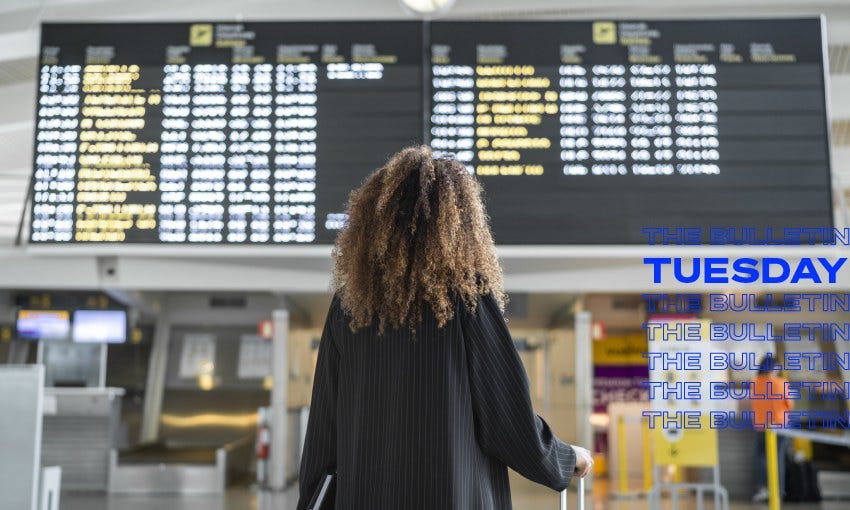The brain drain returns
Kiwibank warns of the highest level of emigration in a decade as New Zealanders face high costs at home and opportunities abroad
Mōrena and welcome to The Bulletin for Tuesday, March 29, by Justin Giovannetti. Presented in partnership with Z Energy.
In today’s edition: Covid surge heads south; NZDF helps Ukraine with intelligence; Jane Campion wins best director; but first, the departure of tens of thousands of New Zealanders.
This year could see the highest level of net emigration in a decade (Getty Images).
Heading for the exit as restrictions fall.
There have been few weekends since Christmas where I haven’t spoken with friends preparing to leave New Zealand. What was once a series of anecdotes is now backed by a growing volume of data. Kiwibank is predicting that 20,000 more people will leave New Zealand this year than arrive. Stuff reports that would be the greatest period of emigration since the Australian mining boom of 2011. Aotearoa’s pre-Covid immigration surge has been in reverse for most of the last 12 months, with the Customs Service counting more departures than arrivals at the border. Since December, the trickle of departures has picked up momentum. It isn’t a flood, but it’s disquietingly large.
What’s driving the busy departures lounge.
New Zealand has a tight labour market, record low unemployment and a clean green image around the world. The border is rapidly opening to new arrivals. The country also has comparatively low salaries, a high cost-of-living, breathtakingly expensive houses and sometimes limited opportunities. Little of this is new. It’s hard to predict what exactly will happen in the coming months. Will workers be enticed to leave for better wages and opportunities? Will long-delayed OEs attract people overseas? Will recently arrived immigrants, after two years of pandemic purgatory, leave to be closer to friends and family? The answer to all is likely yes. Some young New Zealanders told RNZ why they decided to leave.
Convincing long delayed migrants to come.
The other side of the equation is that some people will come the other way and make a home in New Zealand. I asked the prime minister yesterday how she intends to respond to Kiwibank’s prediction. She said immigration officials will be prioritising working holiday visas for young travellers who have already expressed an interest in coming to New Zealand. That’ll help the country’s tourism operators, but not the large skills gaps in medicine, construction and virtually every skilled industry. The NZ Herald (paywalled) has looked at the links between immigration and the country’s worker shortages.
There’s a global war for talent and New Zealand needs to step up.
Interest explains that New Zealand is now competing with the likes of Australia and Canada for skilled workers and it needs to work harder. While Canada set its all-time immigration record last year and has increased this year’s target to even higher levels, officials in New Zealand are looking at a wide immigration reboot. The Productivity Commission is expected to finalise a report next month that considers migration levels going forward. However Aotearoa isn’t just competing for immigrants, its also a target. The NZ Herald (paywalled) reports that international recruiters are now eyeing workers here, with offers of higher salaries and cheaper homes.
Some young people leaving might eventually be a good thing.
It might not be a brain drain, but a boomerang. Stuff reports that many people, leaving on OE or for work overseas, will eventually return home with new skills. Kiwibank is predicting that net emigration should be short-lived, with arrivals outpacing departures by next year. It’ll be important for New Zealand companies to recognise the value of the international experience from returnees and new arrivals. Stuff has written about the incredible struggle migrant doctors face. This is also one of the complaints I’ve heard from people considering leaving New Zealand in recent months: the trouble convincing employers to recognise foreign work. “Sure, you’ve handled marketing campaigns in New York and Chicago, but what do you know about Hamilton?” a New Zealander told me about an unsuccessful interview in Auckland. “The foreign experience was seen as a detriment.” They’ve since left for Toronto.
Covid’s centre of gravity shifting to South Island.
Three weeks after omicron peaked in Auckland, the number of cases in Canterbury is about to be the country’s highest. The rate of infection is “far more intense” around Christchurch, Stuff reports. Auckland now has 132 cases per 100,000, while Canterbury has 361 per 100,000. Overall, omicron cases are down sharply across the country as the wave subsides. However according to 1News, Māori and Pasifika are dying at an alarmingly disproportionate rate. They make up nearly 40% of deaths in the pandemic so far.
NZDF personnel sent to Europe to help with Ukraine intelligence.
Nine intelligence experts are being sent to the UK and Nato headquarters in Belgium, to help sift through information gathered in the war in Ukraine. 1News reports that some of the soldiers will help free up allied intelligence workers to look at other parts of the world. The prime minister also confirmed that five of the NZDF experts will look at satellite imagery and pass on information to Ukraine’s army in real-time. New Zealand isn’t considering sending soldiers directly to Ukraine. Reuters reports that Ukraine’s president is insisting on his country’s territorial integrity as peace talks start. Ukraine’s head of military intelligence said it now seems Russia wants to divide the country in half.
Jane Campion wins best director Oscar for locally-shot film.
The Power of the Dog didn’t win best picture, that went to CODA, but Campion became only the third woman to win the prize for top director. As Stuff reports, the movie was nominated for 12 awards, but only got the one. The New Zealand Film Commission now has staff in Hollywood looking to leverage off the film’s win. But most discussion after the Academy Awards was about the slap heard round the world. Rolling Stone looks at what happened between Will Smith and Chris Rock.
The Spinoff’s Pet Week is brought to you in cahoots with with Animates – and so is this message: With so many dog food options out there, it can be hard to know what to feed your pooch. Wet food is great for a hydration boost, while dry food is excellent for keeping their chompers in check. At Animates we’re trained to help you find the best food for your pet to keep them happy and healthy. Check out more information here or visit your local Animates store. (Sponsored)
Proposed Erebus memorial lacked consultation: Ombudsman.
The site at Dove-Myer Robinson park might not be wrong, but insufficient consultation with local communities was, the Chief Ombudsman ruled. Te Ao Māori News reports that Māori who opposed the site should have been consulted more widely. The National Erebus Memorial in Auckland has considerable support the ombudsman found, and the government should make reasonable steps to deal with grievances before starting construction.
Tauranga’s only election this year hasn’t been called yet.
Most New Zealanders will vote for their councils in local elections later this year. People in Tauranga won’t. After years of political dysfunction, their city will continue to be run by commissioners until July 2024 at the earliest. Tauranga commission chair Anne Tolley spoke to Stuff about the reaction from locals and the ongoing suspension of council. But Tauranga will have one election this year. After Simon Bridges’ departure from politics, a byelection will soon be called. SunLive looks at the candidates for the seat. The last time Labour won the seat was 1935, so it’s National’s to lose.
Got some feedback about The Bulletin, or anything in the news? Get in touch with me at thebulletin@thespinoff.co.nz
Alex Casey investigates why the real rat trade is booming. Nadine Anne Hura looks at how Māori health providers could be a breakthrough for whānau. Simon Pound speaks to Sharesies co-founder Brooke Roberts for Business is Boring. Naomii Seah pays a visit to Pet Refuge, to understand one of the hidden victims of family violence. Kali Mercier asks who gets a conviction for drug possession, and who gets help?
Why it's time for Beauden Barrett to retire.
It’s time for the Barrett to hang up his cleats. The NZ Herald (paywalled) writes that after long-lasting concussions last year, he shouldn’t take any risks. At his best, Barrett was the greatest rugby player in the world. He’s won what there is to win, he has nothing left to prove. Look at tennis. Ash Barty is being celebrated for a smart play last week to retire at the top of her game.













